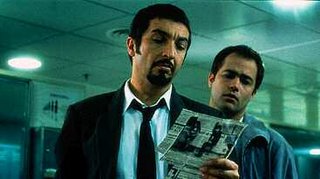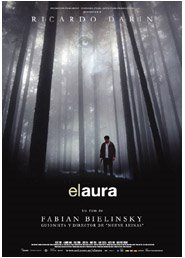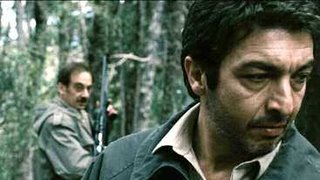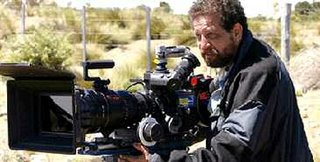Too Soon Gone: The Noir Legacy of Fabián Bielinsky
An edited version of this article appeared in the May/June 2009 issue of the Noir City Sentinel. To subscribe, become a member of The Film Noir Foundation.
 Two movies. That’s not much of a legacy. But the brief filmography of Argentina’s Fabián Bielinsky is enough to prove that, with his death in 2006, world cinema lost more than a gifted storyteller. After watching Nueve Reinas (2000) and the darkly glittering jewel El Aura (2005), Film Noir Foundation founder Eddie Muller said he was “so miserably sure that Bielinsky would have been the greatest writer-director of contemporary noir.”
Two movies. That’s not much of a legacy. But the brief filmography of Argentina’s Fabián Bielinsky is enough to prove that, with his death in 2006, world cinema lost more than a gifted storyteller. After watching Nueve Reinas (2000) and the darkly glittering jewel El Aura (2005), Film Noir Foundation founder Eddie Muller said he was “so miserably sure that Bielinsky would have been the greatest writer-director of contemporary noir.”
Born in Buenos Aires in 1959, Bielinsky earned his stripes as an assistant director on over 400 commercials and numerous feature films. During this fifteen-year apprenticeship he worked on projects as varied as an ad directed by German auteur Wim Wenders and Eversmile, New Jersey (1989), an oddity about an itinerant dentist fated to be remembered as the other movie Daniel Day-Lewis made the year of his Academy Award-winning triumph in My Left Foot. In 1998, Bielinsky received his first above-the-line credit as one of three writers of the allegorical science fiction film La Sonámbula (Sleepwalker). He longed to make his own movies but felt hamstrung by an industry dominated by established names and prejudiced against genre fare. He ultimately made the transition to the director’s chair the way so many of the greats did – by winning a contest. The Patagonik Film Group selected his screenplay out of 350 entries in a 1998 competition, giving Bielinsky a green light and a modest $1.3 million budget. The resulting movie revolutionized Argentinean filmmaking.
Nueve Reinas (Nine Queens) is a con man caper with a distinctive Latin flavor, seasoned by the corruption endemic during Argentina’s fiscal crisis of the 1990s. Veteran grifter Marcos (Ricardo Darín) bails novice Juan (Gastón Pauls) out of trouble for his own selfish reasons; he needs a partner for the day, and his usual sidekick is unavailable. Marcos gives Juan a crash course in the art of the short con. Among his pearls is knowing when to act aggrieved. “The more offended you are, the less suspicious you look,” he advises his protégé. But plans change quickly when an aging confederate presents Marcos with a “once in a lifetime” opportunity – unloading a forgery of the title sheet of Weimar Republic stamps on a shady financier poised to flee the country. To make the score Marcos reaches out to his estranged sister, Juan risks his own nest egg, and each man will have to trust the other.
 Bielinsky’s film is ferociously entertaining. Breezy yet tense, packed with reversals and plot complications but never difficult to follow, culminating in a note-perfect ending. Much of the film’s impact can be traced to the bravura sequence when Marcos points out to Juan the countless “mustard chuckers ... operators, swindlers” hiding in plain sight on the streets of Buenos Aires, watching for any hint of vulnerability on which to pounce. Bielinsky’s on-the-fly technique, which Darín described as “almost as if we were carrying out a raid or pulling off a heist,” only adds credibility. Nueve Reinas posits a world of tricksters and thieves, leavened by the wounded insistence of all involved that they are not crooks. Even the acquaintance offering Marcos a motorcycle with minor damage, namely a “small caliber” perforation in the gas tank, bristles at the accusation. It’s all just business.
Bielinsky’s film is ferociously entertaining. Breezy yet tense, packed with reversals and plot complications but never difficult to follow, culminating in a note-perfect ending. Much of the film’s impact can be traced to the bravura sequence when Marcos points out to Juan the countless “mustard chuckers ... operators, swindlers” hiding in plain sight on the streets of Buenos Aires, watching for any hint of vulnerability on which to pounce. Bielinsky’s on-the-fly technique, which Darín described as “almost as if we were carrying out a raid or pulling off a heist,” only adds credibility. Nueve Reinas posits a world of tricksters and thieves, leavened by the wounded insistence of all involved that they are not crooks. Even the acquaintance offering Marcos a motorcycle with minor damage, namely a “small caliber” perforation in the gas tank, bristles at the accusation. It’s all just business.
Hollywood took note of Nueve Reinas’s international success, but Bielinsky resisted the call. An Americanized version happened without him. As remakes go, Criminal (2004) is not at all bad. It has a nice sense of scale, a game cast featuring John C. Reilly and Maggie Gyllenhaal, and a feel for the multicultural vibe of Los Angeles, beautifully shot by cinematographer Chris Menges. Producers Steven Soderbergh and George Clooney turn it into a scruffy, low-key cousin of their Ocean’s Eleven films. (Soderbergh cowrote the adaptation with director Gregory Jacobs under the name Sam Lowry, the Brazil-inspired pseudonym he used on The Underneath, his 1995 retooling of the classic noir Criss Cross.) Criminal’s primary problem is that it simply cannot compare with the movie that spawned it. It lacks the danger and unpredictability of Nueve Reinas. Some of the best beats and lines from Bielinsky’s film had to be cut because they were unique to the original’s setting. Take the ending. There’s no way it could be used in an American film. Actually, scratch that. It might work now.
Nueve Reinas has a jaundiced view of human relations, but Bielinsky’s noir sensibility would not reach full pungent bloom until his follow-up effort. El Aura, known as Dawn in Argentina, is a singular achievement, a truly existential film that comes across as an unholy combination of Richard Stark and Oliver Sacks. Its cunning use of traditional genre elements – fate, choice and chronic blackouts – makes it one of the finest cinematic noirs of this decade.
 We meet the film’s nameless protagonist (Ricardo Darín again) lying amidst a swirl of ATM receipts, seemingly rehearsing for his own chalk outline. He’s not dead, just suffering from an epileptic fit. The character works as a taxidermist, bloodlessly applying logic to recreate the savagery of animals. As a colleague notes, he has “a weird fantasy for a taxidermist who’s never gotten in a fight with anyone,” and that’s plotting perfect heists he lacks the nerve to carry out. “It can be done neatly. It can be done well ... There’s no reason why anyone should die,” Darín insists. “Yes, there’s a reason,” his skeptical colleague replies. “There’s a load of guys with guns.”
We meet the film’s nameless protagonist (Ricardo Darín again) lying amidst a swirl of ATM receipts, seemingly rehearsing for his own chalk outline. He’s not dead, just suffering from an epileptic fit. The character works as a taxidermist, bloodlessly applying logic to recreate the savagery of animals. As a colleague notes, he has “a weird fantasy for a taxidermist who’s never gotten in a fight with anyone,” and that’s plotting perfect heists he lacks the nerve to carry out. “It can be done neatly. It can be done well ... There’s no reason why anyone should die,” Darín insists. “Yes, there’s a reason,” his skeptical colleague replies. “There’s a load of guys with guns.”
Darín gets an unlikely chance to put his theories to the test. While on a hunting trip he accidentally kills a man, only to discover that his victim was an underworld figure whose plan to rob the local casino is already in motion. The taxidermist can step into the dead man’s role and live the fantasy he has long imagined.
Bielinsky’s growth as a filmmaker, from the effervescent charm of Nueve Reinas to the command on display in El Aura, is hugely impressive. Much of the latter movie plays with minimal dialogue, communicating information purely through images. Consider the sheer elegance of the way Bielinsky uses details in the background of shots to convey that the taxidermist’s wife has left him. He immediately follows this revelation with an extraordinary series of edits moving Darín from his apartment to the lush greenery of the Patagonian countryside. Darín suffers a seizure when he’s alone in the woods about to bring down a deer, and thanks to Bielinsky’s kinetic treatment of the incident we experience it right along with him.
But it’s the robbery scenes that showcase Bielinsky’s mastery. Early in the film, Darín waits with a fellow taxidermist to cash his check. As Darín explains how he’d loot the place, his scheme comes to life. It’s beautifully choreographed mayhem, the sad sacks in line behind them abruptly transformed into icy professionals, Darín and his associate blithely commenting on the action. Contrast this with the botched factory job that occurs halfway through the movie. Darín is no longer conductor but bystander. The sequence deftly illustrates the power and the impotence of bearing witness as Darín reacts to every gunshot and cry of agony, trying to piece together what went wrong.
 El Aura has style to burn, but Bielinsky knew that true noir is about character. He has an able collaborator in Ricardo Darín. The actor shines playing a man who takes refuge in his intellect as he finds his masculinity constantly questioned. He’s at his best during a halting speech to the dead man’s wife in which he explains the not-altogether-unpleasant sensation (the aura of the title) that precedes one of his neurological episodes: “There’s a moment, a shift ... things suddenly change ... The fit is coming, and there’s nothing you can do to stop it. Nothing. It’s horrible ... and it’s perfect. Because during those few seconds, you’re free. There’s no choice. No alternative. Nothing for you to decide.”
El Aura has style to burn, but Bielinsky knew that true noir is about character. He has an able collaborator in Ricardo Darín. The actor shines playing a man who takes refuge in his intellect as he finds his masculinity constantly questioned. He’s at his best during a halting speech to the dead man’s wife in which he explains the not-altogether-unpleasant sensation (the aura of the title) that precedes one of his neurological episodes: “There’s a moment, a shift ... things suddenly change ... The fit is coming, and there’s nothing you can do to stop it. Nothing. It’s horrible ... and it’s perfect. Because during those few seconds, you’re free. There’s no choice. No alternative. Nothing for you to decide.”
That sense of inevitability pervades the movie, ratcheting up the tension and coloring the taxidermist’s actions. Darín has ample opportunity to walk away from the situation, but his refusal to do so – or even to recognize those moments of opportunity – adds force to the ending, which is as bleak as can be. For the taxidermist everything has changed, but nothing is different. Chilling stuff.
Special mention must be made of the dead man’s dog, who alone knows that Darín has disposed of his master. Easily noir’s greatest canine since Pard in High Sierra. And both of Bielinsky’s movies make reference to a shadowy figure known as “El Turco,” integral to each plot but never appearing onscreen. One can’t help but speculate that future Bielinsky films would have drawn us deeper into the Turk’s demimonde.
El Aura did not achieve Nueve Reinas’s level of exposure in the United States. It was distributed via the Independent Film Channel’s First Take series, released on demand and in theaters simultaneously. This approach makes films available to a wider audience – your correspondent saw El Aura on TV on “opening night,” a full three months before its truncated big-screen run in Seattle – but at the expense of publicity. Even being named one of 2006’s best films by The New York Times’s A.O. Scott didn’t garner El Aura additional attention.
Hollywood again made overtures to Bielinsky, but he continued to spurn them. He said it would take a different type of movie to tempt him to America. For crime dramas he would remain in his native Argentina, where he could “keep full control.” Bielinsky undoubtedly had the right idea. It’s unlikely that a studio would give him free rein to make a thriller as spare and unsettling as El Aura.
 On June 26, 2006, El Aura swept Argentina’s film awards, taking home prizes for best picture, Bielinsky’s script and direction, and Darín’s performance among others. Two days later, in a hotel room in São Paulo, Brazil where he was casting a TV commercial, Fabián Bielinsky died of a heart attack at age 47, leaving behind a wife and a young son.
On June 26, 2006, El Aura swept Argentina’s film awards, taking home prizes for best picture, Bielinsky’s script and direction, and Darín’s performance among others. Two days later, in a hotel room in São Paulo, Brazil where he was casting a TV commercial, Fabián Bielinsky died of a heart attack at age 47, leaving behind a wife and a young son.
Two movies. That’s all we’re going to get. Considering the innate understanding of noir that Fabián Bielinsky showed, it’s nowhere near enough.
Labels: DVD, Movies, Noir





